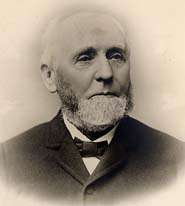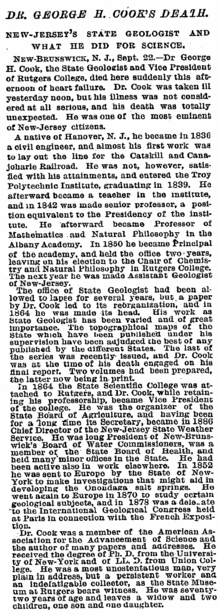George Hammell Cook
| George Hammell Cook | |
|---|---|
 | |
| Born |
January 5, 1818 Hanover, New Jersey |
| Died |
September 22, 1889 (aged 71) New Brunswick, New Jersey |
| Spouse(s) | Mary Halsey Thomas (1821-?) |
| Children | Paul Cook (1847-?), Sarah Cook (1849-?). John Willard Cook (1852-?), Emma Willard Cook (1854-?), Anne Bigelow Cook (1857-?), Robert Anderson Cook (1861-?) |

George Hammell Cook (January 5, 1818 – September 22, 1889) was the State Geologist of New Jersey and Vice President of Rutgers College.[1][2] His geological survey of New Jersey became the predecessor for the U.S. Geological Survey.
Biography
He was born in Hanover Township, New Jersey on January 5, 1818 to John Cook (1786-?) and Sarah Munn (1786-?).[1] He married Mary Halsey Thomas (1821-?) on March 23, 1846. He served as the Principal of The Albany Academy in Albany, New York from 1850 to 1852.[1]
He came to Rutgers in 1853 and was appointed professor of chemistry. His teaching duties also included mathematics and theology. Among his first research projects was the chemical analysis of marl. This research led him to determine better places to mine marl, which led to his appointment as the assistant state geologist. He published a geological survey of New Jersey to replace the one made in 1840.[3]
In 1864 he was appointed as the state geologist of New Jersey.[1]
He had become a Vice President of Rutgers College and was a Fellow of the American Association for the Advancement of Science. He died on September 22, 1889 in New Brunswick, New Jersey.[1]
Legacy
Cook College at Rutgers University was named after him,[3] as is the George Hammell Cook Distinguished Alumni Award.[4]
Timeline
- 1818 Born in Hanover, New Jersey on January 18, 1818
- 1836 Surveyed Canajoharie and Catskill Railroad
- 1839 Graduated from the Rensselaer Polytechnic Institute
- 1839 Tutor at Rensselaer Polytechnic Institute
- 1842-1846 Senior Professor at Rensselaer Polytechnic Institute
- 1848 Professor of Math and Natural Philosophy at The Albany Academy
- 1848-1850 Glass-making in Albany, New York
- 1851-1853 Principal of The Albany Academy
- 1853 Chairman of Chemistry and Natural Sciences at Rutgers College
- 1864-1889 Vice President of Rutgers College
- 1864-1889 State Geologist of New Jersey
- 1872 Published first edition of Geology of New Jersey
- 1879 Appointed Director of the State Agricultural Experiment Station
- 1889 Died in New Brunswick, New Jersey on September 22, 1989, due to heart failure
Publications
- Cook, George Hammell (1868). Geology of New Jersey. Daily Advertiser Off.
External links
- "George Cook". Daily Targum. 2002. Retrieved 2008-07-03.
- National Academy of Sciences Biographical Memoir
Further reading
- Jean Wilson Sidar. (1986). George Hammell Cook: A Life in Agriculture and Geology. Rutgers University Press. ISBN 0-8135-0827-4.
- Sidar, Jean Wilson (1890). "George Hammell Cook". Science (American Association for the Advancement of Science) 16 (387): 8–9. doi:10.1126/science.ns-16.387.8. ISBN 978-0-8135-0827-6. PMID 17807737.
References
- 1 2 3 4 5 "Dr. George H. Cook's Death.; New-Jersey's State Geologist And What He Did For Science.". New York Times. September 23, 1889. Retrieved 2008-07-03.
Dr George H. Cook, the State Geologist and Vice President of Rutgers College, died here suddenly this afternoon of heart failure. Dr. Cock was taken ill yesterday noon, but his illness was not considered at all serious, and his death was totally unexpected. He was one of the most eminent of New-Jersey citizens.
- ↑ "George Hammell Cook". Appleton's Cyclopedia of American Biography. 1889.
Cook, George Hammell, geologist, born in Hanover, Morris County, New Jersey, 5 January 1818. He was graduated at Rensselaer polytechnic institute, Troy, New York, in 1839, and, besides the degree of C. E., received those of born S. and M. S. later. From 1842 till 1846 he was senior professor in that institution. In 1853 he became professor of chemistry and the natural sciences at Rutgers. His chair became in 1867 that of chemistry, natural history, and agriculture, and in 1878 its title was again changed to that of analytical chemistry, geology, and agriculture. In 1880 he became rumply professor of geology and agriculture. Prof. Cook was elected vice-president of the College in 1864, and during the same year was appointed state geologist of New Jersey. In 1880 he was appointed director of the New Jersey agricultural experiment station, of which he has published annual reports. He is a member of several scientific societies and a fellow of the American association for the advancement of science. Besides papers contributed to scientific journals, he has published annual reports as state geologist from 1863 to 1885, and is the author of "Geology of New Jersey" (Newark, 1868).
- 1 2 "History of Cook College: George H. Cook and the Land Grant College.". Rutgers University. Retrieved 2008-04-29.
- ↑ "The George Hammell Cook Distinguished Alumni Award". Rutgers. Retrieved 2008-07-03.
The award, established in 1976, commemorates the life of George Hammell Cook (1818 - 1889) whose efforts helped to bring Land Grant College status to Rutgers and to create the New Jersey Agricultural Experiment Station. Dr. Cook's inquisitive and results-oriented spirit remains active in the ideals embodied by the Cook community which includes the School of Environmental and Biological Sciences and the George H. Cook campus. This award is presented annually to an alumnus or to alumni whose outstanding accomplishments in professional or volunteer work reflects dignity and distinction on their alma mater. The Cook Award is the highest honor presented by the Cook Alumni Association to undergraduate alumni.
|